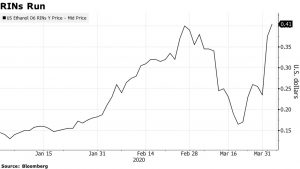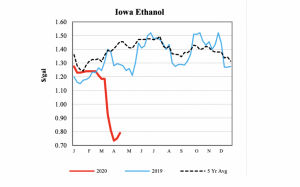Reuters reported Tuesday that "the top U.S. oil and corn industry lobby groups said on Tuesday they were suing the administration of President Joe Biden over its plans to slash…
Five Governors Ask EPA for RFS Waiver
Bloomberg writers Jennifer A Dlouhy and Michael Hirtzer reported last week that, “Five American governors are asking the Trump administration to waive U.S. biofuel-blending requirements, arguing the cost of complying with the mandates on top of coronavirus-spurred lockdowns pose a ‘severe economic harm‘ to the country.
“The governors, including Greg Abbott of Texas and Gary Herbert of Utah, made their plea in letters to the Environmental Protection Agency, which now has 90 days to decide on the matter. Louisiana Governor John Bel Edwards lodged his request earlier, on April 7. Governors Kevin Stitt of Oklahoma and Mark Gordon of Wyoming also are pushing for relief.
The governors cite a spike in the cost of tradable credits refiners use to prove compliance with annual biofuel-blending targets, as well as the coronavirus pandemic that has ravaged fuel demand and already spurred a closure for at least one oil refinery. The credit costs have more than doubled this year.
The Bloomberg writers explained that, “If the EPA rules in favor of the governors, it will be yet another big blow to the American ethanol producers, who make the biofuel primarily from corn. The entire industry is facing a reckoning. Long before the pandemic emptied roads and exacerbated an oil price war, producers were battling chronic oversupply and trade upheaval. Now slumping demand and prices mean smaller producers and those with heavy debt loads will struggle to ride out the losses.”

Last week’s article stated that, “University of Illinois agricultural economist Scott Irwin said it may be difficult to win a general waiver now, since it would be tough to prove that economic harm was not only widespread and broad-based but also caused by the biofuels rule.
“‘There’s a high hurdle to invoke that authority,’ Irwin said by telephone. ‘Certainly, the present EPA would be much friendlier than in the past to a waiver request.’
“Irwin said EPA Administrator Andrew Wheeler has shown ‘creativity’ in how the agency interprets the RFS, which could create an opening here. Biofuel advocates already upset with the administration’s decision to exempt small refineries from the mandates would view an even broader waiver as a ‘declaration of war,’ Irwin said.”

And DTN writer Todd Neeley reported last week that, “[Geoff Cooper, president and chief executive officer of the Renewable Fuels Association] said if COVID-19 led to a 15% drop in gasoline and diesel demand, for example, the renewable fuel blending requirements drop by the same amount.
Hey @EPA & @USDA, what about the letters from ethanol-state senators + our governors? Iowa’s biofuels plants are hurting & shutting down too. Ethanol is a portion of all gasoline after all… https://t.co/CPW4hfZqSm
— Joni Ernst (@SenJoniErnst) April 20, 2020
“‘The EPA has no authority to grant relief when the RFS itself is not the cause of the ‘severe economic harm,’ a fact that has been reconfirmed by EPA multiple times in the past when it denied similar nonsensical waiver requests,’ he said.
“‘The governors themselves acknowledge the problems facing refiners today are driven by COVID-19 and cratering oil prices, not the RFS.’
An EPA spokesperson told DTN, ‘The agency is watching the situation closely, and reviewing the governors’ letter.'”
Also last week, Reuters writer Stephanie Kelly reported that, “The refining and corn industries have long disagreed about U.S. biofuel policy, most recently clashing over the Trump administration’s use of exemptions for small refining facilities in financial distress.
“A federal court in January ruled that Trump’s EPA had granted such exemptions inappropriately, a decision that is likely to dramatically reduce the number of such waivers issued in the future.”







